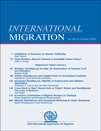
Worker Remittances and Capital Flows to Developing Countries
Worker remittances constitute an increasingly important channel for the transfer of resources to developing countries. Behind foreign direct investment, remittances are the second-largest source of external funding for developing countries. Yet, literature on worker remittances has traditionally focused on the impact of remittances on income distribution within countries, on the determinants of remittances at a micro-level, or on the effects of migration and remittances for specific countries or regions. Macroeconomic determinants and effects of remittances have received more attention only recently. Hence, the focus of this paper is on the macroeconomic determinants of remittances and on differences in these determinants between remittances and other capital flows. We find that remittances respond more to demographic variables while private capital flows respond more to macroeconomic conditions.




